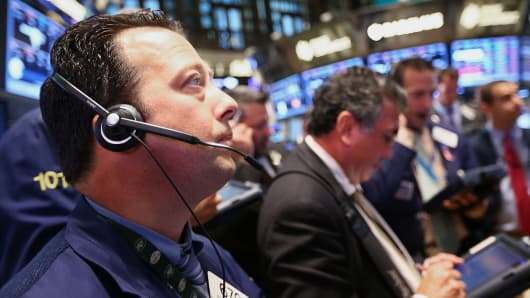Recapping the day's news and newsmakers through the lens of CNBC.
GDP Double Take
Notes:
The U.S. economy grew at a slower pace than estimated facing the headwinds of tepid consumer spending, falling exports and weak investment. GDP expanded at 1.8 percent, down from a 2.4 percent annual growth rate.
That shortfall might have been enough for stock watchers Wednesday, who are on the lookout for reasons the Fed might latch onto to justify pushing back tapering of its bond-buying program. Indeed, the major indexes were up big late in the trading day after Tuesday's 101-point gain.
Quote:
"Wow. This is a pretty big revision. The silver lining is it will probably make the next quarter—which is not very large—look a little more in line with the current 1.8 read. Everybody's pretty much excited about the notion we could put back-to-back positives in the equity markets, but I do point out that yesterday continued the march of higher closing yields in Treasurys. And today it is easing back a bit and the reason? 1.8."—CNBC's Rick Santelli
On Your Six!
Notes:
Even with sequestration and Pentagon cutbacks, Northrop Grumman, Lockheed Martin and Raytheon are all way up year-to-date, but that could change within the next eight years as budgets shift east and China outspends the U.S. and Europe on development.
The U.S remains the world's largest arms dealer at about 39 percent of the market, but that lead will erode, according to Jane's Defence. Russia's 15 percent share stands to grow and China's defense budget has grown 64 percent in four years. Aircraft are the biggest-ticket items because they are the hardest to develop locally. That's also where Lockheed Martin, Boeing, Russia's United Aircraft, Raytheon and BAE Systems earn a significant chunk of their revenue.
Quote:
"Two things are happening: Budgets are shifting east, and global arms trade is [seeing] increasing competition. This is the biggest explosion in trade the world has ever seen."—Paul Burton of IHS Jane's Defense forecast
Platinum Parachute
Notes:
How much is enough to attract good C-suite talent when it comes to pensions? $2 million? How about $10 million? Does $159 million sound good?
McKesson's Chairman and CEO John Hammergren probably would agree with the biggest figure, seeing how he's entitled to that princely sum.
Is that platinum-grade pension in exchange for an unusually low salary, you ask? Nope. Hammergren is among the highest-paid CEOs in the S&P 500. What's more, McKesson—which distributes pharmaceuticals, health-care technology and supplies—has little competition, which apparently doesn't make Hammergren's job the hardest.
Quote:
"I think it's outrageous, borders on obscene. If they think he is worth this why not just give it to him as straight salary? Meanwhile, his straight salary is nothing to scoff at."—Jeffrey Sonnenfeld of the Yale School of Management
Good News, Bad News
Notes:
The good news first: Americans are more optimistic about the economy than they have been since the recession began. Compared with 2007, a greater percentage of those polled recently in CNBC's All-America Economic Survey expect their wages and the value of their homes to rise, while fewer say the economy is in poor shape.
The bad news is that more people are dissatisfied with their standard of living and that fact isn't likely to change anytime soon. A full 44 percent said their standard of living has fallen short of their expectations, compared with 28 percent in 2007. Just 54 percent say their current standard of living has met or exceeded their expectations versus 71 percent in 2007.
Quote:
"I think the big context is really embodied in what Bernanke said. I think it's gotten lost a little amid the market reaction. The economy is getting better. In that context I don't personally think that what's happened in markets over recent days, at least in terms of direction, is surprising. Maybe the sharpness of the selloff in the bond market but not the direction. [Many have said] that when the markets see the end of QE coming or sense it, they will backtrack, maybe overreact. Then they will settle and then will focus on improving economic fundamentals in the U.S., and the U.S. economic fundamentals are improving more than most people think."—Roger Altman of Evercore Partners
—By Doug Cubberley, Special to CNBC.com.


